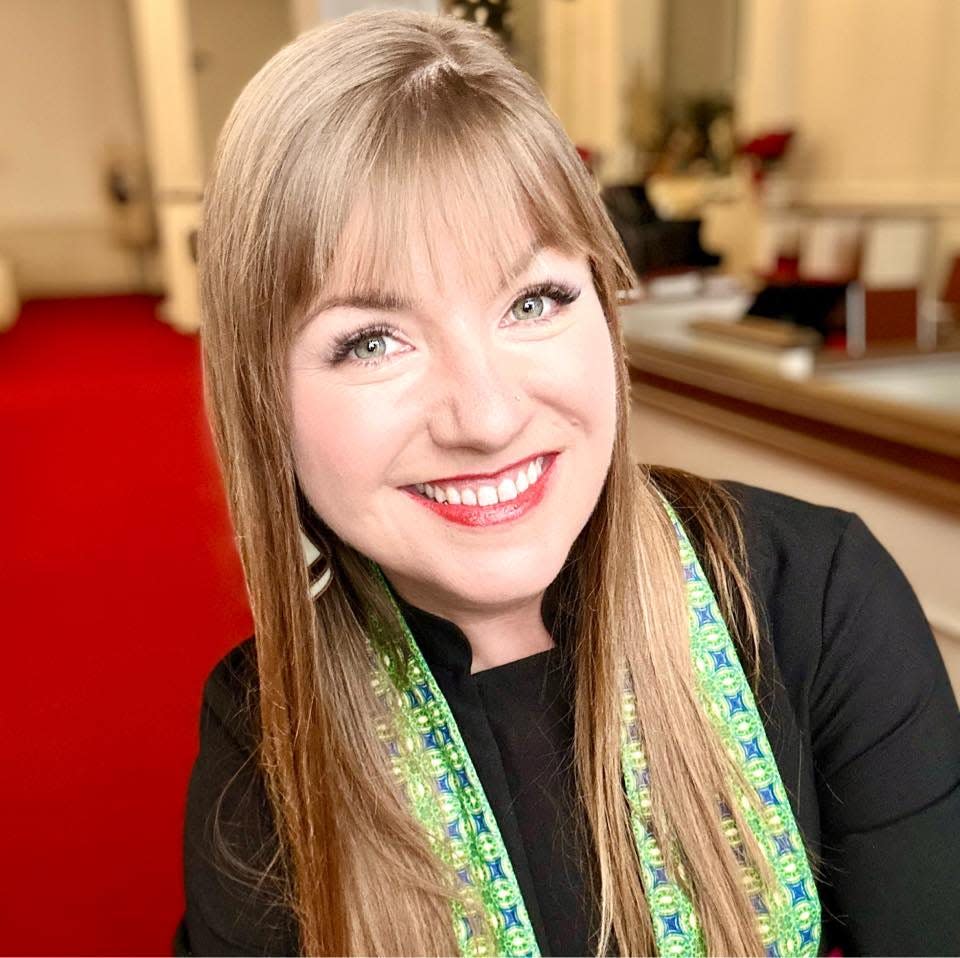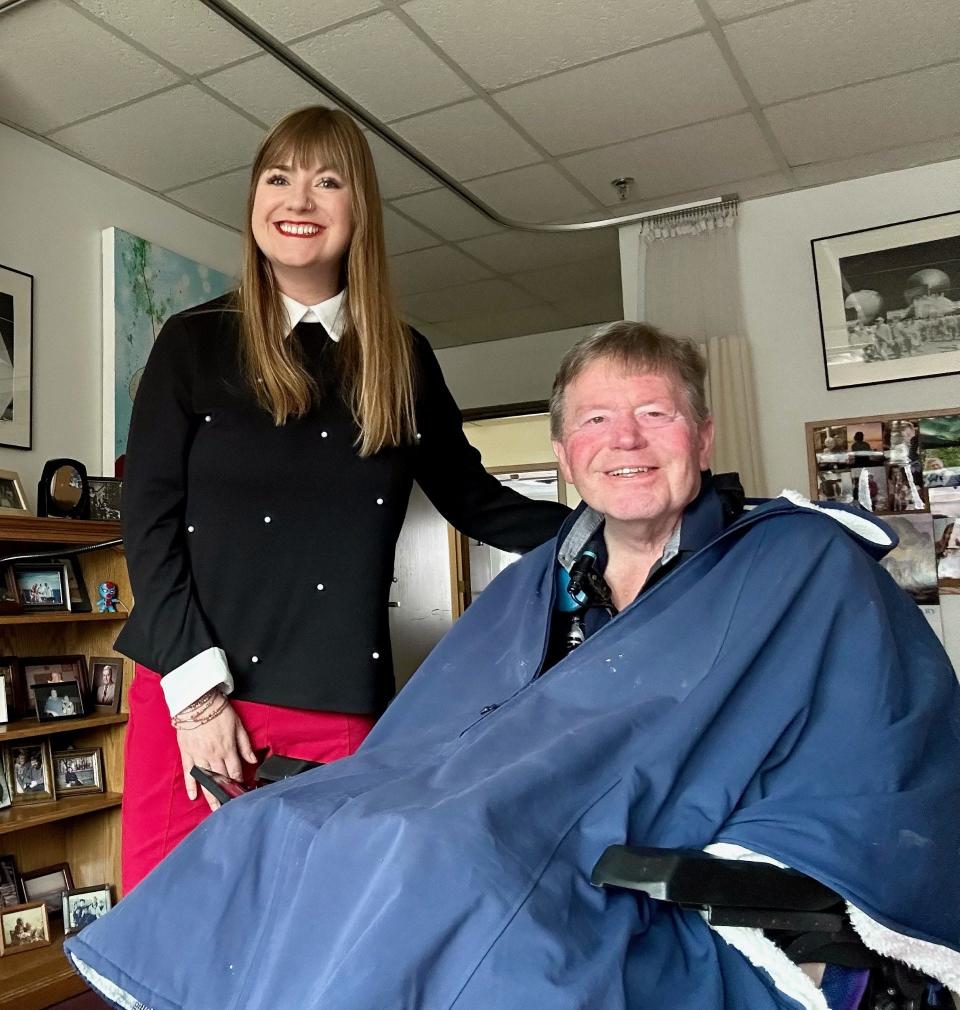Community Christian Church helps erase $1 million in medical debt

NORTH CANTON − The Bible makes more than 3,000 references to debt.
Helping people to climb out of medical debt is more than just a nice thing to do. It's an act of mercy, says the Rev. Dr. Sarah Taylor-Peck.
In commemoration of Taylor-Peck's 10th pastoral anniversary, Community Christian Church at 210 N. Main St. raised $10,000 for R.I.P. Medical Debt, a national nonprofit that multiplied the donation by 100, which generated $1 million in medical-debt relief.
Church members were asked to donate at least $10, or amounts in increments of 10.
Taylor-Peck said she was inspired after becoming a Kettering Foundation Doctoral Research fellow and examining how churches can participate in strengthening and supporting democracy.
One of the things that came out of that research, she noted, was the importance of the collective effort within a church.
"Churches are one of the last places that people of differing ideology can still gather and invest in community impact," Taylor-Peck said. "During this time when democracy is endangered, churches are one of those last institutions that can still help people practice community involvement and exercise their civic muscles.
"One of the specific ways that churches do this is think about things that matter to them and that are universal to the human experience, and then partner across all ideological differences and make an effort together. RIP Medical Debt was an organization that other churches who were associated with the Kettering Foundation Research had partnered with, and so I presented it to our trustee team and our outreach team."
According to U.S. News & World Report, a third of Americans are dealing with medical debt averaging $2,000.
"I think that it's a universal issue," Taylor-Peck said. "Two-thirds of bankruptcy cases are often linked to medical debt. Over 50% of American adults, at some point, have faced medical debt or would be put in a tough spot if they had a surprise $1,000 medical bill."
Since its founding in 2014, RIP Medical Debt has raised $10.4 million to buy outstanding debts, helping more than 7 million individuals and families.
Donations to RIP Medical Debt are not designated for a specific person.
"Instead, they buy medical debt in bulk from hospitals, just the way that predatory collectors do, but they're a non-profit," Taylor-Peck said. "They buy the debt that is most likely to go unpaid. So they buy it for pennies on the dollar and then they forgive it at that rate, too."
To date, RIP Medical Debt has relieved 415,104 Ohioans of $370,609,731 in medical debt, said spokesman Daniel Lempert.
"The impact is multidimensional," he said. "Medical debts are burdening people and, in some cases, impacting their credit scores if it has been reported."
Lempert noted that although most hospitals don't report outstanding debt to credit agencies, some collection agencies who buy the debt do.
"When we buy the debt, we don't report them," he said. "If a debt has been reported to a credit agency, then we ensure that mark is removed by whoever placed it."
"There's also a mental health element," Lempert said. "People who have debt are three times more likely to struggle with anxiety and depression, even if it's a small amount. The fact that someone is looking out for them provides some relief."

Taylor-Peck said helping people with medical debt is indicative of Community Christian's "heart-to-head" approach to ministry.
"We start with the things that touch our hearts that people are called to do. And then we think through solutions," she said.
The Bible frequently mentions debt.
"The scriptures say a lot about debt and money," she said. "Probably more than any other topic. There's a whole life's work to study what especially Jesus said about money and our relationship to money. But I think this program in particular is about forgiveness, and that's an act of mercy. We didn't really concern ourselves with why people have medical debt or the worthiness of the medical debt that was incurred. Instead, we know that gestures of forgiveness and generosity are at the very heart of Christ's work. We also thought about this as a 'loaves and fishes' experience."
The fundraiser started in January and ended Feb 4.
"We had people contributing from across the United States, from California to Florida, to Washington, D.C., and Chicago," Taylor-Peck said. "I had classmates from my master's program at Harvard Divinity School contributing. I just finished a doctorate at Duke and had cohort members contributing. We had family members contributing, and then we had some really beautiful collective contributions like the Bell Choir at Faith United Methodist. Choir director Jody Lindauer directs our bell choir and at Faith United Methodist and she mentioned it to her choir one night when they took an offering. Also, Trinity United Church of Christ, where my husband (Andrew is) the senior minister, made a huge contribution. Our largest single contribution was from them."
Taylor-Peck noted individual acts of kindness, like a teenager who donated $7, which was multiplied to $700.
"My son has an anaphylactic allergy and I know very well, that's the cost of an epi pen without insurance," she said. "I have insurance, but it's just being aware that there's families who don't."
Taylor-Peck said said one of her favorite contributions came from longtime member Chris Dougherty.
"He's in the 60s and he has progressive multiple sclerosis, and he's now in a wheelchair," she said. "And the only way that he can control his movements is with his chin. There's a remote control on his full-body wheelchair. That's all he can do. He's on a fixed income from the government on his disability and he has less than $20 a month for his own personal use. He told his brother the first week of our campaign, 'Michael, make a $10 contribution from me, but I want to be very clear, make it from my money, not yours.' That reminded me of the widow and her two mites making a sacrificial offering."
Taylor-Peck said the RIP Medical Debt fundraiser was also in keeping with her doctoral dissertation: "Cultivating Purple Church: Equipping Church Leaders to Lead Politically Diverse Congregations as a Radical Act of Loving Our Neighbors and Restoring the Beloved Community."
"I called my study the 'purple church,' when you have political differences and political diversity within your congregations," she said. "Purple church doesn't mean a melting pot, that we're trying to get everyone to have uniformity of thought. It means that we honor the different places that we come from, and we seek understanding through curiosity, sharing our humanity, and remaining in close proximity with one another because they're so few places where people are staying at the table with those who disagree with them."
She added that unifying behind a common purpose while respecting individuality has been the intentional work of Community Christian Church.
" We did not lose anyone who leveraged their membership during the pandemic," she noted. "We did not lose people during the divisive elections because they felt angry about something political, and that that's really intentional. That was the basis of my research at the foundation and also at Duke. The topic of my dissertation was how churches remain whole in this fractured world."
Taylor-Peck said her parishioners are proud of their accomplishment.
"A little church like ours, we average about 100 to 120 people on Sunday," she said. "This was big for us to be able to make an impact like this. But more than that, it invited people to share their stories."
She said she's spoken with parishioners whose family members struggle with medical debt.
"Even though nobody chooses their health issues or their health crisis, there's still an element of shame whenever you're talking about debt whenever you're in a position where you can't afford things that are your basic needs," she said. "So, I think there's also something in that gesture of generosity to say we're not dissecting the reasons for the debt, or evaluating the worthiness of forgiveness. We're saying 'We believe in a God of love and here's that love incarnate.'"
To learn more about Community Christian Church, visit its Facebook page.
Reach Charita at 330-580-8313 or charita.goshay@cantonrep.com. On Twitter: @cgoshayREP.
This article originally appeared on The Repository: North Canton church helps to erase $1 million in medical debt

